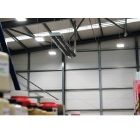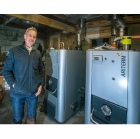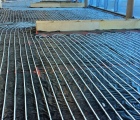
Getting the best out of heat interface units
Heat interface units (HIUs) have a key role to play in enhancing the user experience of community heating and maximising its efficiency. Colin Judd of BSRIA explores the issues.

Powrmatic radiant heaters protect advanced paints
Powrmatic has supplied two radiant U-tube heaters to provide effective temperature control for the warehouse of Keim Mineral Paints in Telford. These natural, water-born silicate paints produce a micro-porous coating that is waterproof while allowing the substrate to ‘breathe’. Given the complex formulation of the paints, environmental conditions in the warehouse are critical to maintaining product quality.

Biomass boilers heat Yorkshire Riding centre
One of Europe’s leading equestrian training centres has chosen Bio-Nordic to design and install a decentralised energy network based around a modular Ariterm biomass system. Two Biocomp PX 60 kW wood-pellet boilers are at the heart of the group-heating network at Yorkshire Riding Centre to heat several buildings — including the Courtyard Guest House, its adjacent accommodation block and other lodges and chalets.

Oventrop delivers underfloor heating for new college campus
Oventrop’s projects division has designed, supplied, installed and commissioned a 2000 m2 Cofloor underfloor heating system at the new Cardiff & Vale College. This campus covers an area of 16 000 m2 and is close to the centre of Cardiff. It will eventually house 4000 students, 250 staff and offer 200 course options.

‘Red tape scrapping is welcome – but more policy changes are needed’
The CEO of heat pump manufacturer Aira UK has said the government’s new proposals to scrap planning red tape for the installation of heat pumps in the UK will be a big breakthrough for the industry and consumers – but more policy changes are needed.
New procurement rules for NHS suppliers
New procurement rules mean NHS suppliers will need to demonstrate their green credentials so the NHS can achieve its target of becoming net zero for directly-controlled emissions by 2040, with an ambition to reach an 80% reduction in its carbon emissions between 2028 to 2032.







